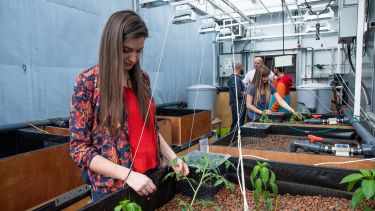Surviving climate chaos
While we can easily pop out for fresh fruit and crusty bread we’ll probably continue to take food for granted. But a combination of population growth, resource scarcity and climate change have left our food supplies vulnerable. How can we produce food in a way that can withstand these challenges?
.JPG.jpg?itok=WI24SwtV)
If we’re going to survive, we need to become more resilient.
Soil, the nonrenewable resource we rely on for all of our crops, is degrading at a rate of 24 billion tonnes a year due to the intensification of farming and use of fertilisers. “We have 20 years of harvest left based on current levels of soil degradation and fertility. Just 20 years,” explains Hamish Cunningham, Professor of Internet Computing at the University of Sheffield.
Hamish has spent the last five years working with colleagues in the University of Sheffield Institute for Sustainable Food to develop a new approach to food security. But the focus for him isn’t sustainability. Instead, he frames his work in terms of resilience.
The new approach is now being rolled out in a project called Resilient Campus, Resilient City (RC2). RC2 will see self-supporting mini-farms built in old shipping containers, first on campus and then across the city, to grow crops on a small scale in a controlled environment. The small size of the farm means it can be built into nooks and crannies in towns and cities across the UK without disruption to the surrounding environment. But what you might not expect is the abundance of fish in the farm…
The mini-farm relies on an aquaponics system, a technique for growing plants in water that replaces fertilisers with fish. The fish provide nitrogen rich waste which is broken down by bacteria and then used by the plants for growth — a process that cleans the water. It’s one of the greenest ways to grow food; the only energy required is electrical and can be produced using any number of renewable resources.
The resulting system wants for nothing, everything’s already there. It’s the perfect closed system that uses 10% of the water used in conventional agriculture, and doesn’t rely on either pesticides or fertilisers. It’s also soil free thanks to the soilless growing mediums developed in the University's Department of Chemistry.
If we consider sustainability to be living within our means then resilience is withstanding dramatic change.
Professor Hamish Cunningham
Professor of Internet Computing
A major benefit of the mini-farm is that it provides food on a local scale, removing the risks associated with food flown thousands of miles over the oceans. “Anything produced a long way away is at the mercy of economic shocks and climate changes, if we can get the basics nearby then we’re more resilient,” says Hamish. But what’s also important is that the concept can be adopted by anyone.
Aquaponics isn’t a new technology - there’s evidence of people using systems as far back as 1000 AD - but Hamish’s work brings the mini-farm into the 21st century through open source technology. It balances the ecosystem within the farm, controlling water flow, heating and lighting. This information is then available online to anyone who wants to access and use it to develop their own mini-farm. “The whole point is to show other people how they can do it themselves and provide people with the right tools,” explains Hamish. It’s a system that can be scaled up to entire community level or scaled down to desktop size on a kitchen table.
Eventually we expect to see mini-farms all over the country and in nooks and crannies on every university campus. But the first of these mini-farm will be on the University of Sheffield campus and will provide fresh produce for the shops and outlets on campus.
This alternative to our contemporary food system puts the mini-farm at the heart of the University of Sheffield Institute for Sustainable Food. “The Institute is about changing food systems, our current systems are widely regarded as being broken for various reasons so we’re changing that by growing food locally using soil free methods,” says Hamish. This approach, funded by the Higher Education Innovation Fund Impact Accelerator Account, British Council and the Global Challenges Research Fund, addresses the entire agrifood system, from field — or shipping container in this case — to fork.
“We don’t need any more discoveries, we know how to do things in a low impact fashion, now we need people to do them,” says Hamish. Often people feel powerless to impact real change, but the mini-farm is an example of our researchers giving power to everyone. Becoming resilient will not be easy, but with technology and innovation like the mini-farm we all have the opportunity to be resilient in the future.
More details at wegrow.social and unphone.net.
By Alicia Shephard
Research from this project was presented at the Planet to Plate Festival
Hamish Cunningham and Gareth Roberts take you on a virtual walk-through of Sheffield’s new aquaponics mini-farm and discuss how urban farming can contribute to food resilience.
Further information
Funders
Higher Education Innovation Fund Impact Accelerator Account
British Council
Global Challenges Research Fund
Research profiles
Hamish Cunningham, The University of Sheffield
For more information please contact:
Sophie Armour
Media Relations Officer
University of Sheffield
+44 114 222 3687
sophie.armour@sheffield.ac.uk



